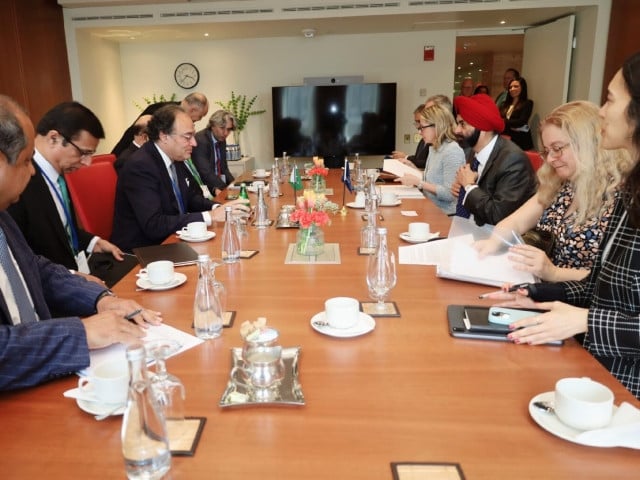ISLAMABAD
Pakistan has been reassured by the World Bank (WB) of its unwavering support for reforms and digitization initiatives aimed at stabilizing the economy and increasing income.

In a press release from the finance ministry, Minister of Finance and Revenue Muhammad Aurangzeb said that during their meeting with President Ajay Banga of the World Bank Group, they discussed Pakistan’s achievements during the nine-month Standby Arrangement (SBA) program as well as ongoing reforms in the three priority areas of energy, taxation, and privatization.
The statement stated that all parties concurred on the necessity of a ten-year rolling country framework plan and that the minister had extended an invitation to the president to visit Pakistan.
The minister also conferred with Masatsugu Asakawa, head of the Asian Development Bank (ADB), on how to fortify Islamabad’s alliance with the ADB while safeguarding the nation’s concessional financing envelope and pipeline of upcoming projects.
The finance minister also had a meeting with Scott Nathan, the CEO of the US International Development Finance Corporation (DFC). They discussed at the meeting potential avenues for DFC to increase its interests in Pakistan after resolving unresolved matters amicably.
The minister disclosed that in order to maximize PPP potential and private sector participation, the government was supporting creative financing options. The statement also stated that he gave the assurance that the government was dedicated to offering all feasible support to investment projects by any local or foreign companies in Pakistan.
The World Bank’s Board of Executive Directors approved financing for $149.7 million earlier this month for Pakistan’s “Digital Economy” and “Flood Prevention” programs, which aim to improve economic efficiency, coordination, and transparency as well as prevent future floods.
The World Bank reports that $78 million has been set aside for the “Digital Economy Enhancement Project,” which will use technology and data-driven decision-making to strengthen Pakistan’s financial system. The project’s success depends on the country’s ability to sustain its expanding digital economy.
A separate $71.7 million has been set aside for the Sindh barrage improvement project in order to guarantee flood protection. The project will lessen the negative consequences of catastrophic flood and drought events and strengthen the canal system’s resilience.
According to World Bank predictions, the rate of inflation will stay at 26% in the current fiscal year 2023–24. However, the rate is expected to drop to 15% in the following fiscal year 2024–25, and then to 11.5% in 2025–26.
Documents from the World Bank indicate that during the first half of the current fiscal year, inflation in Pakistan reached its highest level since 1974. The high price of gas and electricity was cited as the reason for the large increase in production expenses.
The World Bank emphasizes that rising gas and electricity prices are the main factor contributing to Pakistan’s inflationary trend.










































